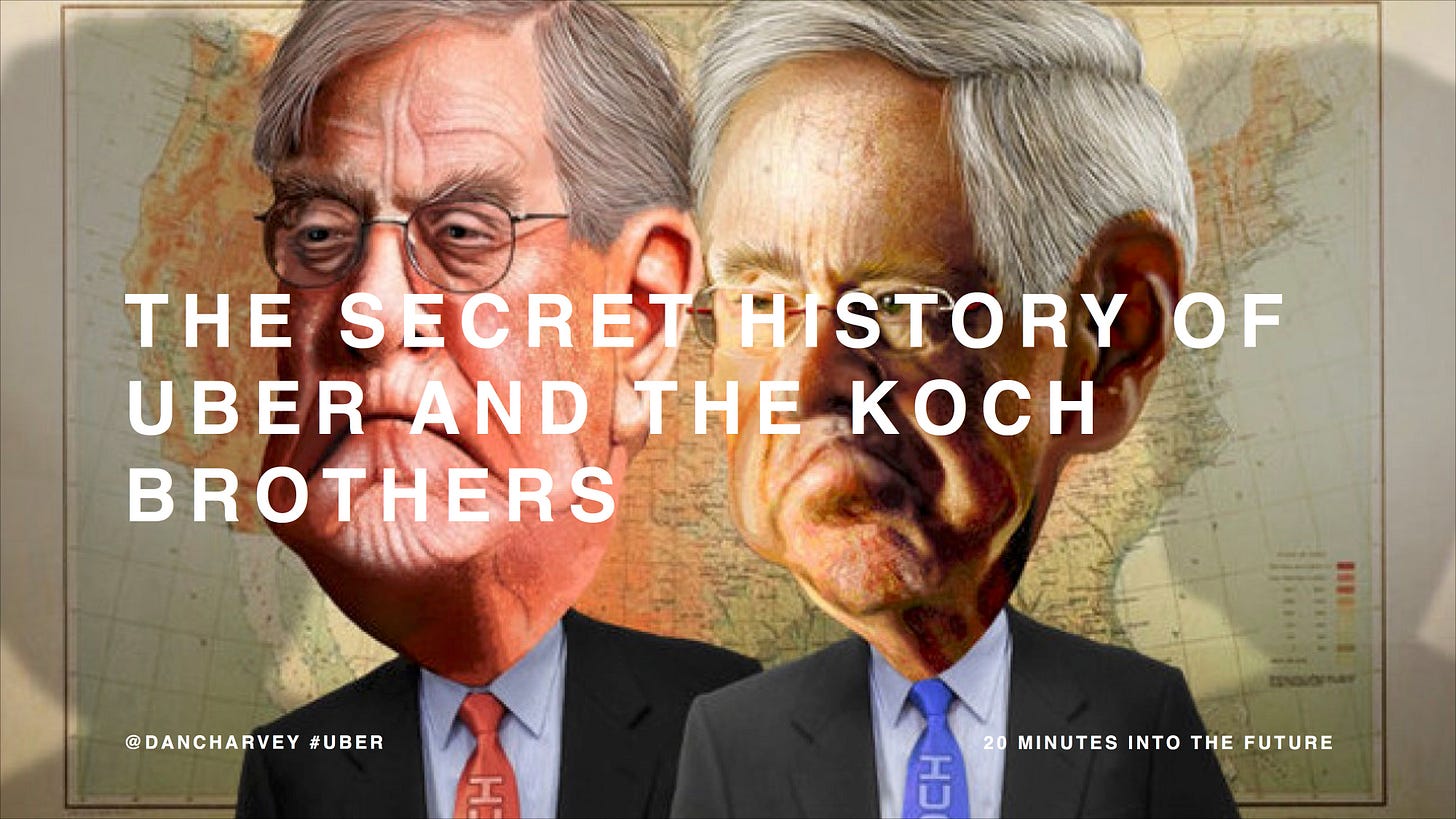Uber and The Koch Brothers
Hello from 20 Minutes into the Future. This week’s letter is 769 words, a 3-minute read. Tonight we’ll be taking a critical look at the little-known political roots of Uber.

This post is part 1 of a series, Push a Button, Get a Car, Create Economic Injustice. In it, I’ll be exploring the exploitative nature of Uber’s business and its ramifications for the future. Up first, how Travis Kalanick & Garrett Camp copy-and-pasted Uber from Koch Brothers propaganda.
In the 80s, 17 American cities deregulated their local taxi industries. They did so to address decades long issues with service and increase employment. It didn't take them long to realize regulation was not the issue and to role back to a regulated state. In each city rather than improve service, things got worse:
fares went up
operating costs went up even more
taxi productivity went down
added service went to already well-served areas (airport routes and city centers)
added driver employment was negligible
In the 90s dozens of pro-corporate libertarian think tanks campaigned for taxi deregulation. Oil mogul billionaires and petrol death cultists, The Koch Brothers funded each campaign. Yes, those Koch Brothers.
The campaigns used simplistic narrative construction to frame their evidence-free arguments. As with with the failed effort in the 80s the claims were that deregulation would:
lead to the end of "evil cab cartels" and "corrupt regulators" and beholden city officials
unlock job opportunities for "entrepreneurial drivers"
consumers would see lower fares, shorter wait times, and greater service to poor areas
If your Google Translate doesn't support Corporate Doublespeak then let me help:
the first point is a dig at unions
the second point is a friendlier way to say 'indentured servitude"
the third is that great American pastime of promising consumers a free lunch
Those unfounded claims spread far and wide in the mainstream media of the day. The narrative construction was Randian in nature. Poor service and regulation on one side and innovation and economic freedom on the other. Of course no deep dive into taxi economics was ever done to show how these benefits would come about. Who needs numbers when you could have a libertarian morality play instead?
And if those campaign beats sound familiar then that’s because they are. They're used in marketing, PR, and interviews to this day by Uber. They copy-and-pasted them from the talking points of these think tanks funded by The Kochs.
Unlike most startups, Uber had PR and marketing teams in place from day 1 in 2010. Kalanick & Camp knew they would never have the platform efficiencies of say, Amazon. They also knew they would be engaging in illegal behavior. San Francisco might fall for their con but places like New York and DC would be harder nuts to crack. So they turned to DC insider and Obama campaign manager David Plouffe to lead their PR efforts.
Uber’s true innovation is that it brought perception management to Silicon Valley. Its PR efforts are more partisan propaganda and political campaigning than marketing. Put another way by transport expert Hubert Horan:
Narrative construction is perhaps Uber’s greatest competitive strength. Uber’s desired framing—that it was fighting a moral battle on behalf of technological progress and economic freedom—was uncritically accepted by the mainstream business and tech industry press, who then never bothered to analyze the firm’s actual economics or its anticompetitive behavior.
Plouffe’s efforts worked. Framed in those moralistic terms anyone anti-Uber was clueless or a bleeding heart. Fictions of “Technological progress” and “economic freedom” obfuscated any concerns about:
rider safety
workers rights
regulatory disobedience & illegal behavior
how Uber’s business was only sustainable via VC subsidies
citizens having any say in transport policy in their cities
Once more from Horan:
Outlets like the New York Times, Washington Post, New Yorker, Bloomberg, and the Atlanticwere apparently oblivious to the fact that they were amplifying claims crafted by Koch-funded groups designed to undermine market competition, the concept of urban transport as a public good, and the legitimacy of any form of regulatory authority. The regular repetition of the company’s narrative by seemingly independent, elite outlets concealed its manufactured, top-down origins, and established it as accepted public opinion not requiring further debate.
The extent of Uber’s propaganda powers was first seen on full display in 2012. Some cities started raising concerns about Uber and threatened to throw them out. Still others moved to regulate Uber properly as the taxi service it clearly is. The company mobilized its wealthy customers to flood officials with social media messages demanding they recant their positions. Both sides were taken for a ride: the customers by not understanding the unsustainable and subsidized nature of their fares and the politicians by not knowing how manufactured and coordinated the efforts were.
File under: #uber #propaganda #businessmodels #economicinjustice
Next week: We’ll dig into details of Uber’s predatory practices.
Thanks for reading 20 Minutes into the Future. Have a friend or colleague who'd like the newsletter? Invite them to sign up. Any friend of yours is a friend of mine. Good night, and good future.
20 Minutes into the Future is a critical look at how technology is shaping our lives today. And what actions we can take for a better tomorrow. If you you're not already a subscriber and found this newsletter worth your while then please sign up.
Daniel Harvey writes 20 Minutes into The Future. He is a product designer and has written for Fast Company, Huffington Post, The Drum, & more. If you're pissed about the current state of tech and want to see us do better then you’ve found a kindred spirit.
You can email him at daniel.harvey@gmail.com or follow him on Twitter @dancharvey.



